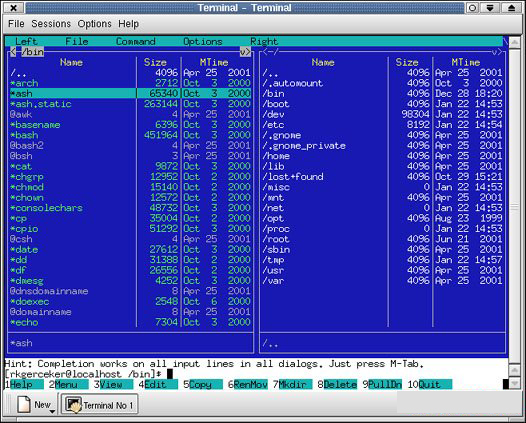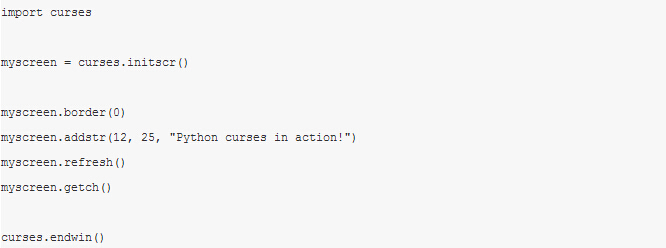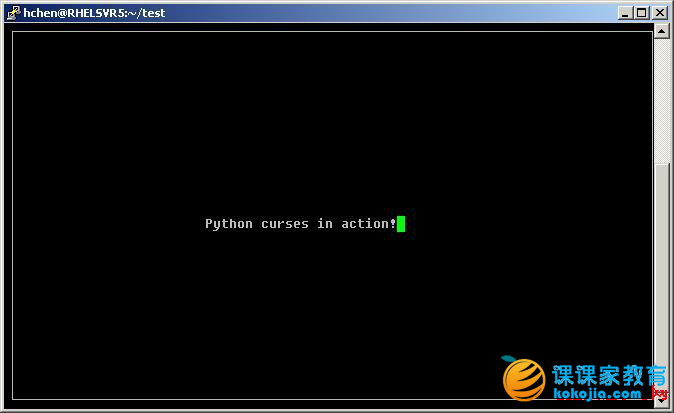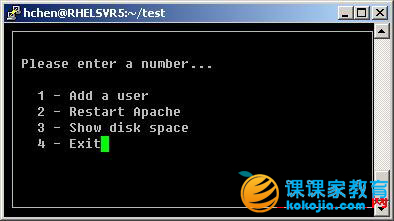Ncurses可以在任何遵循ANSI/POSIX标准的Unix/Linux系统上运行,除此之外,它还可以从系统数据库中检测终端的属性,,并且自动进行调整,提供一个不受终端约束的接口。因此,Ncurses可以在不同的系统平台和不同的终端上工作的非常好。
mc工具集就是一个用ncurses写的很好的例子,而且在终端上系统核心配置的界面同样是用ncurses编写的. 下面就是它们的截图:

当然,在我们这篇文章中,我们不会教你怎么写NCurses程序,我们只是想告诉你如何用Python来写Ncurses的程序,示例会非常简单,点到为止。
在此之前,我们先简单的回顾一下如何使用Python的一些简单的语法。
先看看一个最简单的Python程序:

程序很简单,我就不多说,把这个文件存成test.py,然后在命令行下调用python test.py就可以看到输出了。
下面我们再来看一个Python的函数定义——还是很简单,我也不用多说了。

好,言归正传,让我们来看一下,如何在Python中使用NCurses,下面是一个小例程:

注意这个示例中的第一行import curses,表明使用curses库,然后这个示像在屏幕中间输出“Python curses in action!”字样,其中坐标为12, 25,注意,在字符界面下,80 x 25是屏幕大小,其用的是字符,而不是像素。下面是运行后的抓屏:

最后,我们再来看一个数字菜单的示例:
#!/usr/bin/env python
from os import system
import curses
def get_param(prompt_string):
screen.clear()
screen.border(0)
screen.addstr(2, 2, prompt_string)
screen.refresh()
input = screen.getstr(10, 10, 60)
return input
def execute_cmd(cmd_string):
system(“clear”)
a = system(cmd_string)
print “”
if a == 0:
print “Command executed correctly”
else:
print “Command terminated with error”
raw_input(“Press enter”)
print “”
x = 0
while x != ord(‘4’):
screen = curses.initscr()
screen.clear()
screen.border(0)
screen.addstr(2, 2, “Please enter a number…”)
screen.addstr(4, 4, “1 – Add a user”)
screen.addstr(5, 4, “2 – Restart Apache”)
screen.addstr(6, 4, “3 – Show disk space”)
screen.addstr(7, 4, “4 – Exit”)
screen.refresh()
x = screen.getch()
if x == ord(‘1’):
username = get_param(“Enter the username”)
homedir = get_param(“Enter the home directory, eg /home/nate”)
groups = get_param(“Enter comma-separated groups, eg adm,dialout,cdrom”)
shell = get_param(“Enter the shell, eg /bin/bash:”)
curses.endwin()
execute_cmd(“useradd -d ” + homedir + ” -g 1000 -G ” + groups + ” -m -s ” + shell + ” ” + username)
if x == ord(‘2’):
curses.endwin()
execute_cmd(“apachectl restart”)
if x == ord(‘3’):
curses.endwin()
execute_cmd(“df -h”)
curses.endwin()
下面是运行时的显示:

以上就是Python教程内容的所有知识,想了解更多Python视频教程详情可登陆课课家官网进行查询观看!






